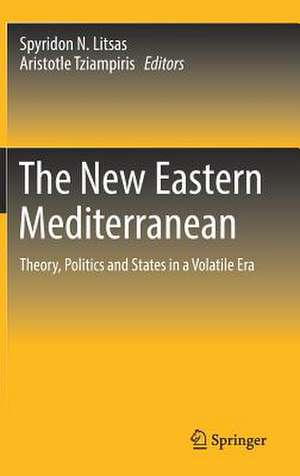The New Eastern Mediterranean: Theory, Politics and States in a Volatile Era
Editat de Spyridon N. Litsas, Aristotle Tziampirisen Limba Engleză Hardback – 22 iun 2018
| Toate formatele și edițiile | Preț | Express |
|---|---|---|
| Paperback (1) | 383.33 lei 6-8 săpt. | |
| Springer International Publishing – 8 ian 2019 | 383.33 lei 6-8 săpt. | |
| Hardback (1) | 390.63 lei 6-8 săpt. | |
| Springer International Publishing – 22 iun 2018 | 390.63 lei 6-8 săpt. |
Preț: 390.63 lei
Nou
Puncte Express: 586
Preț estimativ în valută:
74.76€ • 77.76$ • 61.72£
74.76€ • 77.76$ • 61.72£
Carte tipărită la comandă
Livrare economică 15-29 aprilie
Preluare comenzi: 021 569.72.76
Specificații
ISBN-13: 9783319907574
ISBN-10: 3319907573
Pagini: 219
Ilustrații: XV, 193 p. 15 illus., 14 illus. in color.
Dimensiuni: 155 x 235 x 13 mm
Greutate: 0.48 kg
Ediția:1st ed. 2019
Editura: Springer International Publishing
Colecția Springer
Locul publicării:Cham, Switzerland
ISBN-10: 3319907573
Pagini: 219
Ilustrații: XV, 193 p. 15 illus., 14 illus. in color.
Dimensiuni: 155 x 235 x 13 mm
Greutate: 0.48 kg
Ediția:1st ed. 2019
Editura: Springer International Publishing
Colecția Springer
Locul publicării:Cham, Switzerland
Cuprins
Chapter 1: The New Eastern Mediterranean as a Regional Subsystem.- Chapter 2: De Facto States Unbound in the Eastern Mediterranean.- Chapter 3: Destruction and Reconstruction of Cultural Heritage in Eastern Mediterranean.- Chapter 4: Greece's Prospects in the New Era.- Chapter 5: The Political Economy of the Eastern Mediterranean.- Chapter 6: Competitive Authoritarian Regimes in the Eastern Mediterranean.- Chapter 7: The EU as an International Actor.- Chapter 8: Eastern Mediterranean: A New Region?.- Chapter 9: Cyprus Partnerships in the Eastern Mediterranean.- Chapter 10: Israeli Euroscepticism as a New Foreign Policy Instrument.- Chapter 11: Egypt's New Foreign Policy in East Mediterranean.- Chapter 12: Israel and the Mediterranean. - Chapter 13: The Russian Foreign Policy in the Eastern Mediterranean.
Notă biografică
Dr. Spyridon N. Litsas is Associate Professor of International Relations at the University of Macedonia in Thessaloniki, Greece. He is also a Visiting Professor of International Relations and Eastern Mediterranean Politics at the Institut d’ etudes politiques de Grenoble (SciencesPo at the University of Grenoble) and a Visiting Professor of International Relations and Strategic Analysis at the Joint Supreme College of War of the Hellenic Armed Forces. He has obtained his Doctorate of Philosophy at the University of Durham, UK. He is teaching, researching and publishing on War Theory, Strategic Analysis, Security Issues such as Jihadism, Politics of the Eastern Mediterranean, Middle East and North Africa, US & Russian Foreign Policy in South-Eastern Europe, the Eastern Mediterranean and the Middle East, Turkish Foreign Politics etc. His most recent publications include: ‘Stateness and Sovereign Debt: Greece in the European Conundrum’ (with Prof. Kostantinos Lavdas & Professor DimitriosSkiadas), ‘The Eastern Mediterranean in Transition: Multipolarity, Politics and Power’ (eds. with Professor Aristotle Tziampiris), ‘Foreign Policy Under Austerity: Greece’s Return to Normality?’ (eds. with Professor Aristotle Tziampiris), ‘The European Common Security and Defense Concept: Opprotunities and Challenges’, Mediterranean Quarterly, 2017, vol. 28, no.3. pp. 56-67.
Dr. Aristotle Tziampiris is Professor of International Relations, Chair of the Department of International and European Studies and Director of the MSc Program in Energy: Strategy, Law & Economics at the University of Piraeus. He is also Standing Fellow at New York University's Remarque Institute, member of the Executive Academic Board of the European Security and Defence College (ESDC), Academic Advisor to the Hellenic American Leadership Council (HALC) and Academic Coordinator for the Erasmus+ "Eastern Mediterranean Regional Training Partnership" Program.
Textul de pe ultima copertă
This book provides an introduction to the Eastern Mediterranean region and introduces the concept of the Eastern Mediterranean as a new regional subsystem. Due to recent events in contemporary international politics, the Eastern Mediterranean can be seen as a laboratory where the balance of power among Great Powers and regional states are being tested. Written by leading academics in their respective fields, this book addresses key developments in the area and argues that the Eastern Mediterranean should be viewed as a distinct region. Particular emphasis is given to the initiatives undertaken by Israel, Greece, Cyprus, and Turkey; the role played by the United States and Russia; and the issues of energy, migration, and Islamic terrorism. Bringing together relevant information and theoretical debates, this book will be of interest to graduate students and academics studying international relations and politics in the Eastern Mediterranean, as well as policymakers and journalists whowant to have a clearer understanding of developments in the region.
Caracteristici
Introduces the concept of the Eastern Mediterranean as a new regional subsystem Discusses current issues of importance to the region including energy politics, migration, and Islamic terrorism Includes diverse, interdisciplinary perspectives
